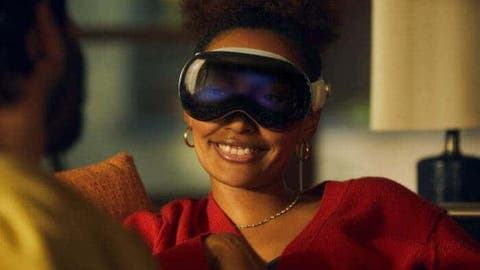Apple has recently announced its latest mixed reality (MR) headset, the Apple Vision Pro, which is set to release early next year in the US. The headset is designed to handle what Apple refers to as “spatial computing” and is a true MR headset that interacts with the physical world around you. According to BusinessKorea, the new Apple MR headset with virtual reality (VR) and augmented reality (AR) functions is the “next change” in the industry. An IT Home report claims that just like the current mobile phone rivalry, the future of the MR headset will have a rivalry between many brands. The report also reveals that Apple is set to face serious rivalry with other brands like Samsung and Qualcomm. These big brands are also set to launch their own AR/VR headsets.
Apple Vision Pro vs Samsung and Qualcomm’s Headsets
Apple Vision Pro
The Apple Vision Pro is a true mixed-reality headset that interacts with the physical world around you and keeps you engaged with it as well thanks to its EyeSight feature. The headset has 23 million pixels between the two displays, and Apple says that the Vision Pro has 64 times the pixel density of the iPhone, as each display is just the size of a postage stamp. The headset is set to release early next year in the US and is priced at a whopping $3499.
MR headsets from other brands
ITHome also reports that many brands such as Samsung, Qualcomm and Google are working on MR products. These firms aim to launch these devices as early as this year. Google is responsible for the development of MR-specific operating systems, Qualcomm is responsible for the development of MR-specific chipsets, and Samsung will launch MR hardware products.
Sameer Samat, Google’s vice president of product management, said at Google’s annual developer conference in May
“We’re excited about our new collaboration with Samsung Electronics in the immersive XR space. We’ll have more to share later this year,”
Samsung filed a trademark application for Galaxy Glasses with the Korean Intellectual Property Office in February. There are reports that the shape of Samsung’s XR products is more like ordinary glasses. It will not be like the ski goggles we have in the Apple Vision Pro.
It is worth noting that this is also the first time that the likes of Samsung, Google and Qualcomm will unite for the XR market. In the past, each brand chose to do it alone and then gave up on the process at some point. For example, Google launched the Daydream project in 2016 to develop a VR platform for mobile phones. But the company abandoned the plan in 2019. Samsung previously launched a Gear VR headset with Meta subsidiary Oculus in 2014 but hasn’t released a product since.
Market research firm Counterpoint Research predicts that global MR/XR headset shipments will grow from 18 million units in 2022 to 110 million units in 2025. It also claims that by 2030, the number will hit 1 billion units.
Conclusion
The Apple Vision Pro is a true mixed-reality headset that interacts with the physical world around you. It also keeps you engaged with it as well thanks to its EyeSight feature. It has 23 million pixels between the two displays. Apple says that the Vision Pro has 64 times the pixel density of the iPhone. Each display is just the size of a postage stamp. Indeed, Apple is setting a standard that others will try to beat.
Samsung and Qualcomm are also working on AR/VR headsets. But they are not expected to compete with the Vision Pro individually. It appears that this time, there will be cooperation between brands such as Samsung, Qualcomm and Google. While Samsung will have the hardware product, Google will provide the software while Qualcomm will provide the chips.
